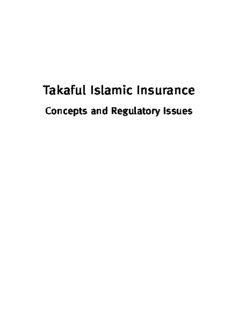
Takaful Islamic Insurance: Concepts and Regulatory Issues PDF
Preview Takaful Islamic Insurance: Concepts and Regulatory Issues
Takaful Islamic Insurance Concepts and Regulatory Issues Takaful Islamic Insurance Concepts and Regulatory Issues Edited by Simon Archer Rifaat Ahmed Abdel Karim Volker Nienhaus JohnWiley&Sons(Asia)Pte.Ltd. Copyright©2009JohnWiley&Sons(Asia)Pte.Ltd. Publishedin2009byJohnWiley&Sons(Asia)Pte.Ltd. 2ClementiLoop,#02–01,Singapore129809 Allrightsreserved. No part of this publication may be reproduced, stored in a retrieval system, or transmittedinanyformorbyanymeans,electronic,mechanical,photocopying, recording,scanning,orotherwise,exceptasexpresslypermittedbylaw,without either the prior written permission of the Publisher, or authorization through payment of the appropriate photocopy fee to the Copyright Clearance Center. RequestsforpermissionshouldbeaddressedtothePublisher,JohnWiley&Sons (Asia)Pte.Ltd.,2ClementiLoop,#02–01,Singapore129809,tel:65-6463-2400, fax:65-6463-4605,e-mail:[email protected]. Thispublicationisdesignedtoprovideaccurateandauthoritativeinformationin regard to the subject matter covered. It is sold with the understanding that the publisherisnotengagedinrenderingprofessionalservices.Ifprofessionaladvice or other expert assistance is required, the services of a competent professional personshouldbesought. Neithertheauthorsnorthepublisherareliableforanyactionspromptedorcaused bytheinformationpresentedinthisbook.Anyviewsexpressedhereinarethose oftheauthorsanddonotrepresenttheviewsoftheorganizationstheyworkfor. OtherWileyEditorialOffices JohnWiley&Sons,111RiverStreet,Hoboken,NJ07030,USA JohnWiley&Sons,TheAtrium,SouthernGate,Chichester,WestSussex,P019 8SQ,UnitedKingdom JohnWiley&Sons(Canada)Ltd.,5353DundasStreetWest,Suite400,Toronto, Ontario,M9B6HB,Canada JohnWiley&SonsAustraliaLtd,42McDougallStreet,Milton,Queensland4064, Australia Wiley-VCH,Boschstrasse12,D-69469Weinheim,Germany LibraryofCongressCataloging-in-PublicationData ISBN 978-0-470-82352-1 Typesetin10.5/13ptSabonbyLaserwordsPrivateLimited,Chennai,India. PrintedinSingaporebyMarkonoPrintMediaPte.Ltd. 10987654321 Contents Dedication ix AbouttheEditors xi AbouttheContributors xiii Foreword xvii Acknowledgment xix 1 Conceptual,Legal,andInstitutionalIssuesConfrontingTakaful 1 SimonArcher,RifaatAhmedAbdelKarim,andVolkerNienhaus 1.1 Introduction 1 1.2 DevelopmentsinInternationalPrudentialGuidelinesfor InsuranceandTakaful 2 1.3 ContentsofthisBook 3 Part 1 2 BusinessModelsinTakafulandRegulatoryImplications 9 SimonArcher,RifaatAhmedAbdelKarim,andVolkerNienhaus 2.1 Introduction 9 2.2 BusinessModels 11 2.3 BusinessStructuresandRegulatoryImplications 20 2.4 RegulatoryPerspectives 27 3 Shari’ahPrinciplesGoverningTakafulModels 31 Dr.MohdDaudBakar 3.1 Introduction 31 3.2 Takaful:NomenclatureandConceptualMeaning 32 3.3 Shari’ahPrinciplesGoverningTakafulContracts 34 3.4 TakafulManagementModels 42 4 CorporateGovernanceandStakeholderRights inIslamicInsurance 47 SimonArcher,RifaatAhmedAbdelKarim,andVolkerNienhaus 4.1 Introduction 47 4.2 The Neo-classical and Neo-corporatist Models of Corporate Governance 49 4.3 CorporateGovernanceIssuesintheInsuranceIndustry 53 4.4 CorporateGovernanceIssuesinTakaful 57 4.5 ConcludingRemarks 65 v vi Contents 5 LegalIssuesinTakaful 67 MadzlanMohamadHussain 5.1 Introduction 67 5.2 TakafulModelsandtheirImpacts 68 5.3 TheLegalIssues 72 5.4 TheCallforanEffectiveFramework 81 5.5 ConcludingRemarks 82 6 BusinessConductinIslamicInsurancewithSpecialReference toEmergingMarkets 85 ArupChatterjee 6.1 Background 85 6.2 BusinessEnvironmentinEmergingMarkets 86 6.3 FrameworkofBusinessConductandBestPractices 90 6.4 CriticalDriversforDevelopingMarketInfrastructure 101 6.5 Conclusion 107 7 SupervisoryIssuesinTakaful:AnOverview 113 PeterCasey 7.1 Introduction 113 7.2 GovernanceIssues 115 7.3 FinancialIssues 121 7.4 MarketConductIssues 130 7.5 MarketIssues 135 7.6 SupervisoryPriorities 137 Part 2 8 ReinsuranceandRetakaful 143 MahomedAkoob 8.1 Introduction 143 8.2 WhatisReinsurance? 143 8.3 FunctionsofReinsurance 145 8.4 TypesofReinsurance 145 8.5 ProportionalReinsurance 147 8.6 Non-proportionalReinsurance 149 8.7 ReinsuranceMarket 151 8.8 ConceptofTakaful 151 8.9 NeedforRetakaful 154 8.10 RetakafulModels 156 8.11 MainIssuesRaisedbyRetakaful 162 8.12 Conclusion 167 9 RiskManagementinTakaful 169 AbdullahHaronandDawoodTaylor 9.1 Introduction 169 9.2 ComparisonbetweenConventionalInsuranceandTakaful 172 Contents vii 9.3 Fundamental Principles of Takaful from a Risk Management Perspective 175 9.4 RiskIssuesinTakafulUndertakings 176 9.5 ManagementofRisksinaTakafulUndertaking 184 9.6 ConcludingRemarks 191 10 SolvencyandCapitalAdequacyinTakaful 193 JamesSmith 10.1 Introduction 193 10.2 TheNeedforSolvency 194 10.3 ThePrincipleofSolvency 195 10.4 TraditionalApproachestoInsuranceSolvency 197 10.5 Risk-basedCapital 200 10.6 Summary 214 11 InvestmentPortfoliosofTakafulUndertakings 217 Dr.AbdulrahmanTolefat 11.1 TotalInvestmentPortfolioofTakafulUndertakings forAllFunds 218 11.2 Shareholders’Funds 219 11.3 Analysis of Shareholders’ Funds between the GCC Countries andMalaysia 224 11.4 GeneralFund 226 11.5 AnalysisofGeneralFundbetweenGCCandMalaysia 229 11.6 FamilyFund 232 11.7 Influence of Related Parties on the Investment Portfolios of Participants’Funds 234 11.8 SummaryandConclusions 236 12 IssuesinRatingTakafulCompanies 239 AndrewMurray 12.1 Introduction 239 12.2 WhatisaCreditRating? 240 12.3 TypesofCreditRating 240 12.4 CreditRatingBasics 241 12.5 KeyIssuesforRatingTakafulFirms 243 12.6 Conclusion 263 13 TransparencyandFinancialReportinginIslamicInsurance 265 ElhamHassanandAndreRohayem 13.1 Introduction 265 13.2 Stakeholders Need Transparency in Financial Reporting by IslamicInsuranceCompanies 266 13.3 ExistingIslamicInsuranceFinancialReporting FrameworkShouldbeImprovedtoAchieveGreater Transparency 274 13.4 Conclusion 283 viii Contents Part 3 14 ConcludingRemarks 287 SimonArcher,RifaatAhmedAbdelKarim,andVolkerNienhaus 14.1 Introduction 287 14.2 TheStructureofTakafulUndertakingsandResultant UnresolvedIssues 288 14.3 CorporateGovernanceandRelatedMatters 289 14.4 The Need for, and Scope of, a Comprehensive Regulatory FrameworkforTakaful 292 14.5 The Work of the IFSB in Developing International Prudential GuidelinesforTakafulUndertakings 293 14.6 SomeThoughtsfortheFuture 294 Bibliography 297 Index 301 Dedication Wewouldliketodedicate thisbooktoourwives Iglal,Evelyne,and Hannelor. About the Editors Professor Simon Archer is Visiting Professor at the ICMA Cen- tre, Henley Business School, University of Reading (U.K.), where he teaches on an MSc program, Investment Banking and Islamic Finance. Previously, he was Professor of Financial Management at the University of Surrey (U.K.) having been Midland Bank Professor of Financial Sector Accounting at the University of Wales, Bangor. After studies in Philosophy, Politics, and Economics at Oxford Uni- versity,hequalifiedasaCharteredAccountantwithArthurAndersen in London and then moved to Price Waterhouse in Paris, where he became a Partner in Management Consultancy Services. In addition to being co-editor of, and chapter contributor to, Islamic Finance: Innovation and Growth, and Islamic Finance: The Regulatory Chal- lenge(publishedbyJohnWiley),ProfessorArcherisco-authorofthe CCHInternationalAccounting/FinancialReportingStandardsGuide andtheauthorofaconsiderablenumberofacademicpapersoninter- nationalaccounting andonaccounting, finance, andrelated issuesin Islamic financial institutions. He also supervises research students in these areas. He has carried outa number ofconsultancy assignments for the Accounting and Auditing Organization for Islamic Financial Institutions,theIslamicFinancialServicesBoard,andtheWorldBank onissuesconnected withIslamicfinance. ProfessorRifaatAhmedAbdelKarimhasbeentheSecretary-General oftheIslamicFinancialServicesBoardsince2002.Priortohiscurrent position,ProfessorRifaatwastheSecretary-GeneraloftheAccounting and Auditing Organization for Islamic Financial Institutions, a post heheldformorethaneightyears.HewasamemberoftheStandards Advisory Council of the International Accounting Standards Board fortwoterms,andiscurrentlyamemberoftheConsultativeAdvisory GroupoftheInternationalAuditingandAssuranceStandardsBoard. Professor Rifaat was a Visiting Professor at Surrey University (U.K.) and Honorary Professor at Monash University (Australia). He is currentlyaVisiting ProfessoratReading University(U.K.). Professor Rifaatistheco-authorofBusinessandAccountingEthicsinIslam,the EuromoneybestsellerbookIslamicFinance:InnovationandGrowth, andIslamicFinance:TheRegulatoryChallengerecentlypublishedby JohnWiley.Heisalsotheauthorofmanyacademicandprofessional xi xii AbouttheEditors papers on accounting, governance, and finance issues in Islamic bankingandfinance. Dr. Volker Nienhaus was Professor of Economics at the German universities of Trier (1989–90) and Bochum (1990–2004) before he became President of the University of Marburg (election period 2004–10).HehaspublishednumerousbooksandarticlesonIslamic economics and Islamic banking and finance since the 1980s. He was a member of several academic advisory boards of public and private institutions in Germany, including the German Orient-Foundation (1993–2006)andtheFederalMinistryofEconomicCooperationand Development (1998–2008). In 2006, he was appointed a member of the Governing Council of the International Centre for Education in Islamic Finance (INCEIF) in Kuala Lumpur. He is also consultant to the Islamic Financial Services Board on governance issues of takaful operations.
Description: